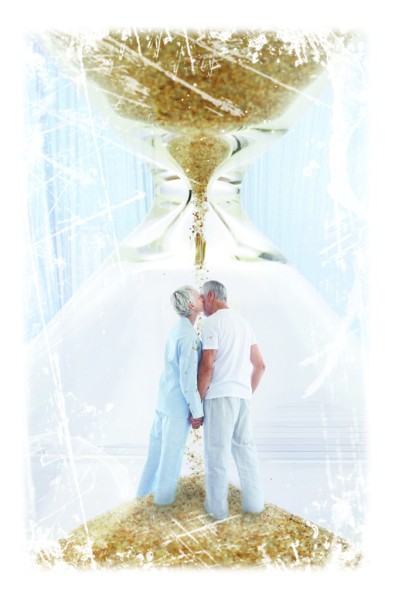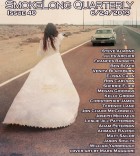Old age is strength and survivorship, triumph over all kinds of vicissitudes and disappointments, trials and illnesses.—Margaret Eliza Kuhn
Last year, when cancer broke into our house, crept into our bedroom, and held a knife to your throat, I froze. You, so much braver, staved off the inevitable for nearly six months, letting him skulk about in your liver, then root for plunder in your bones. Hostages, we padded around our days in PJs and slippers, me watching your every move, learning how to tuck sheets like envelopes around the mattresses and how to clean mirrors with a soft T-shirt, yours. The dog shadowed us, too, always looking over his shoulder, fearing more intruders and cowering from cancer, who kept swinging a boot his direction, aimed at his ribs.
One morning, you demonstrated how a toothbrush scoured so well the crannies around a faucet. “Chuck,” you called me because my white bathrobe, belted tight around my waist, had always looked like a karate costume. “Chuck, you’ll have a black belt in survival when we’re finished here.”
You meant: when you were finished.
~
One afternoon in month two, we notarized our will, assigning money to our children, two daughters and an only son. On paper, we labeled our cars and furniture—Sue, Jessie, Dale—so eventually, when you were gone and I was left behind, as if back from some glorious vacation, our marriage one long honeymoon already fading from memory, home would feel like the wrong suitcase, a mix-up at the airport, the contents inside so normal but not mine.
That night, I left the front door unlocked, coaxing the flu inside. She climbed into our bed, with you, me, cancer. She curled up beside the dog. She shuttered my lungs, and I admit it: I tried to seduce her. I slept without blankets; stood outdoors in the rain; took cold, brutal showers. I encouraged her to stop by anytime.
“Chuck,” you said, “don’t take up with the wrong crowd when I’m gone.”
~
Month three, you gave lessons in coupons and grocery stores because you’d always done the shopping and worried I couldn’t manage a budget. You taught me to flip utensils onto their feet in the dishwasher so their food-crusted heads peeped over the basket and got a thorough scrub. To add vinegar to the laundry to brighten whites, especially my robe. And to wind the grandfather clock once a week, six key-turns, lest the pendulum stall, the weights drop, the hours call it a day.
~
Month four, cancer rifled, like a pickpocket, through your lymph nodes. Our beloved children visited on the weekends—with tape dispensers and pads of paper, sticking their initials to lamps, candles, clocks, whatever they wanted that we hadn’t already allotted. I welcomed a stroke into our home then, went successfully limp in one leg, blind in one eye. You eyed suspiciously all our visitors, such thieves, but swept and dusted, never complained. You taught me Campbell’s soup, frozen dinners, mac and cheese, said, “Chuck, don’t forget to eat when I’m gone.”
The dog started hiding under the bed.
Both of you must have wondered why I never kick-chopped the prowlers.
Where was the hero of this story?
~
Some night in month five, while the rest of us were sleeping, you grew attracted to the knife at your throat, and because cancer promised to make it quick and clean, you packed your bags and ran away with him.
Afterward, our kids came and took some of their property; I didn’t need two chairs, two lamps, two of anything. I lurched round the yard, down the hall, about the kitchen, angling my good eye always toward the dog so I didn’t run him over. I washed my robe nightly so it smelled like you every morning.
~
Who were you and I kidding?
By month eight, dishes piled in the sink. The bed was a tousle, the sheets kicked loose. The house felt so empty I would have welcomed, just as you’d predicted, the company of more criminals. I wanted murderers, serial killers, a hit man with good aim.~
In month eleven, our kids scolded me after I wore my robe to the grocery store, where dementia, like an old maid on the prowl for a man, chatted me up in produce.
I told her I couldn’t remember if I needed chicken noodle, glass cleaner, vinegar. Did I buy them last week? Afterward, she followed me home, tried on all your clothes, and I mistook her for you.
In the mirrors, cloudy in your absence, I saw a man I also didn’t recognize—some martial arts has-been named Chuck, his white robe moth-eaten, his arms stick-thin, his skull round and naked as a ping-pong ball, and his face a junk heap with one working eye and one beater.
The dog didn’t know him, either. He bared his teeth, snarled.
~
Soon, our kids will come for the rest of their belongings. They’ll laugh out loud at the cupboards stocked with twenty-one cans of soup, fifteen bottles of Windex, twelve jugs of vinegar, and thirty boxes of mac and cheese. They’ll curse the year’s worth of junk mail and daily newspapers crowding the den. They’ll shoo all the ladies hiding in your closet, pretending to mourn you. And they’ll play tug-of-war with our sofas and tables and linens.
The dog, even he, will sniff me out, shrunk and hiding under the desk or behind the fridge. He’ll paw-paw-paw until I beetle into the open. All gonzo, he’ll clamp his jowls around my arm and thrash hard. My stuffing will strew across the floor. My pong-head will dangle from my neck.
Angry when he trips over what’s left of me, always underfoot, our son will snatch me up by a slipper, wet with dog-slobber, and drop me into the garbage.
So relieved the house is secure again—something you and I couldn’t manage—the dog will buck on the bed, romp the couch, toss pillows and cushions. He’ll howl and dance on your clothes. Our children will pat his head and give him treats.
“Bravo!” they’ll sing. “Bravo!”



 The core workshop of SmokeLong Fitness is all in writing, so you can take part from anywhere at anytime. We are excited about creating a supportive, consistent and structured environment for flash writers to work on their craft in a community. We are thrilled and proud to say that our workshop participants have won, placed, or been listed in every major flash competition. Community works.
The core workshop of SmokeLong Fitness is all in writing, so you can take part from anywhere at anytime. We are excited about creating a supportive, consistent and structured environment for flash writers to work on their craft in a community. We are thrilled and proud to say that our workshop participants have won, placed, or been listed in every major flash competition. Community works.